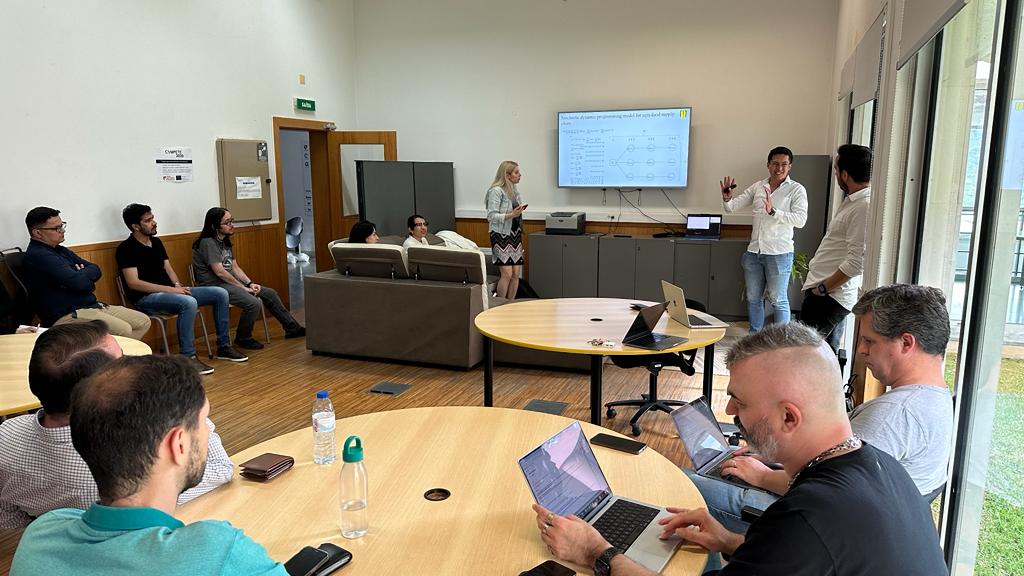21st of June at 16h00, David Álvarez-Martínez, Daniel Hernando Cuellar Usaquen, and Alejandra Tabares will give three short presentations, to promote discussion on two relevant ongoing or disruptive topics. Afterwards, there will be a social gathering where everyone can talk freely on whatever subjects they like.
Location: G4.1
Daniel Hernando Cuellar Usaquena – “Solving replenishment operations in agri-food supply chains in the context of e-commerce”
Bio
Industrial Engineer from Universidad de la Salle and master’s in industrial engineering from Universidad de los Andes in Bogotá – Colombia. He is a member of the research group Center for Optimization and Applied Probability (COPA), attached to the Universidad de los Andes. During his undergraduate studies, he worked as a Young Researcher, developing two research projects oriented to the development of optimization tools applied to the logistics and transportation sector. Additionally, he obtained the distinction of meritorious degree work in his undergraduate thesis solving goods packing problems with approximate optimization. Mr. Cuellar has extensive experience developing approximate optimization algorithms and solution methodologies for combinatorial optimization problems with or without uncertainty sources. He is currently studying doctoral studies at the Universidad de los Andes, focusing on the study and optimization of agri-food supply chains in the context of e-commerce.
Abstract
The agro-food supply chain plays a critical role in the global economy, ensuring the efficient delivery of food and agro-food products from farms to consumers. Route availability is essential for the effective operation of agro-food supply chains. Disruptions due to road closures, natural disasters, accidents, or infrastructure deterioration can significantly impact their performance, resilience, and sustainability. This paper uses Stochastic Dynamic Programming (SDP) to assess the risks associated with route unavailability in the agro-food supply chain using a lookahead approximate dynamic programming methodology. This paper aims to develop and apply an SDP-based optimization model for the agro-food supply chain, focusing on measuring the risk-level of route unavailability into the problem of replenishing products from agro-food producers for a big seller. The proposed SDP-based approach enables decision-making under uncertainty and provides valuable insights for the large seller to optimize replenishment decisions in the face of potential disruptions. Ultimately, this research contributes to developing effective strategies and decision-support tools for managing route availability risks in the agro-food supply chain, ensuring the continued provision of vital agro-food products to global consumers. The outcomes of the proposed method reveal an increase in revenue of up to 20% and a decrease in unsatisfied demand categorized as up to 1% in the case of independent disruptions. A reduction in unsatisfied demand of more than 20% is obtained with zoned disruptions. In future work, we would like to consider risk measure restrictions to guarantee a minimum service level of satisfied demand or a maximum operational cost.
David Álvarez-Martínez
Bio
Black Belt Six Sigma, Arizona State University – ASU (USA)Postdoctoral Fellow, Applied Optimization Systems Group, Polytechnic University of Valencia – UPV (Spain)Ph.D. in Electrical Engineering (Automation Science), São Paulo State University – UNESP (Brazil)M.Sc. in Electrical Engineering (Computer Science), Technological University of Pereira – UTP (Colombia)B.Sc. in Systems and Computer Engineering, Technological University of Pereira – UTP (Colombia)
Abstract
The Physical Internet aims to make logistics more efficient and sustainable. It represents a reorganization of freight transport and long-distance logistics, based on the lessons learned from the creation of the Internet as we know it today. Interconnected autonomous networks, along with protocols, ensure the routing of data during information exchange, thus finding their way without human intervention.This concept applies the data exchange that occurs on the Internet to freight transport associated with automatic transport control. In this comparison, within the Physical Internet, the data is represented by boxes, pallets, or containers. The objective is to optimize the use of existing vehicles, assets, and infrastructure through open logistics networks and the flexible routing of goods. This in turn leads to increased efficiency for businesses and society by reducing energy consumption and emissions.
Alejandra Tabares
Bio
Dr. Alejandra Tabares holds a degree in Industrial Engineering from Universidad Tecnológica de Pereira. She further expanded her knowledge with a master’s degree and a doctorate in Electrical Engineering from Universidade Estadual Paulista Júlio de Mesquita Filho.
She was a doctoral fellow at Universidad de Castilla la Mancha UCLM in Spain from 2017-2018, a program funded by CAPES, Brasil. Furthermore, she accomplished her postdoctoral fellowship at the Foundation for the Support of Research of the State of Sao Paulo (FAPES), Brazil.
Currently, she brings her expertise to her role as an Assistant Professor at the Department of Industrial Engineering at Universidad de los Andes in Colombia. Since 2021, she has also been an active member of the COPA research group.
Dr. Tabares’ primary research interests lie in the fusion of distributed renewable energies within electric power distribution systems, the optimal function of microgrids, the dynamics of new energy markets at the distribution level, and the decentralization of electric power systems. Her work continues to contribute significantly to the ever-evolving field of Electrical Engineering.
Abstract
In the contemporary energy landscape, the integration of reliability in the planning stages of distribution energy networks and the energy management systems of microgrids has become paramount. This presentation explores two primary research areas addressing these challenges: (1) the inclusion of reliability in distribution energy network planning, and (2) energy management in microgrids.
The first part of the discussion delves into the critical role of reliability in energy network planning. By integrating reliability considerations during the planning phase, distribution systems can become more robust and resilient, capable of withstanding diverse operational and environmental scenarios. This section will present the latest methodologies and strategies, demonstrating how a reliability-focused approach can lead to more efficient and reliable energy distribution.
The second part of the presentation focuses on the energy management systems in microgrids. As decentralized energy production becomes more prevalent, the effective management of microgrids grows in importance. The presentation explores advanced energy management techniques to balance the supply and demand in microgrids, optimize energy efficiency, and increase system stability.
By illuminating these areas of research, the presentation aims to demonstrate how a focus on reliability can elevate both the planning and operational stages of our energy systems, leading to a more sustainable and resilient energy future

